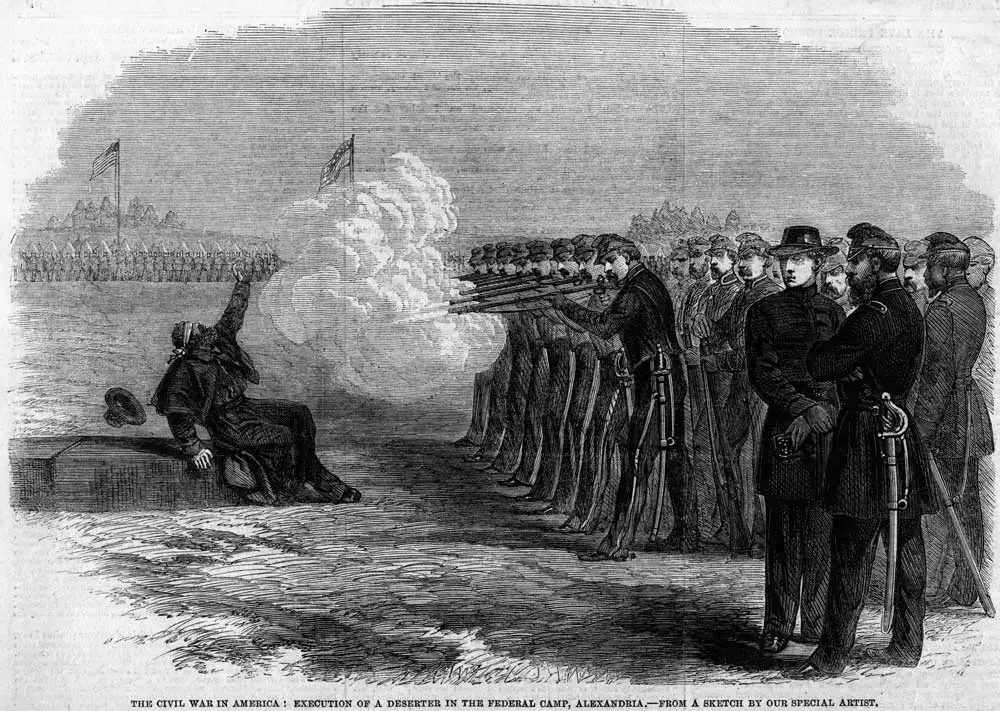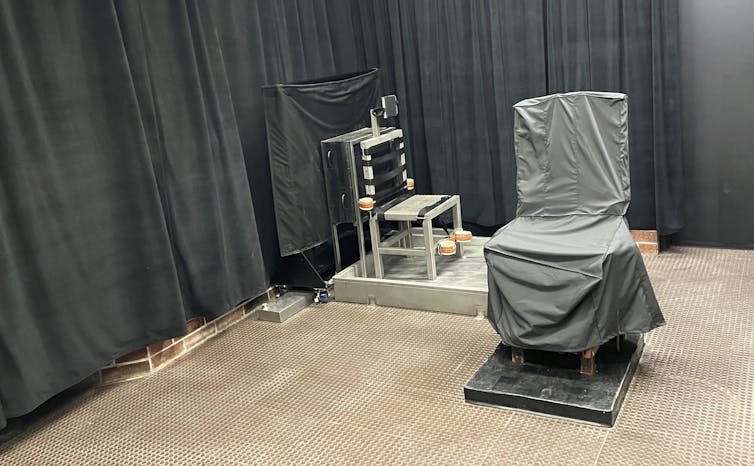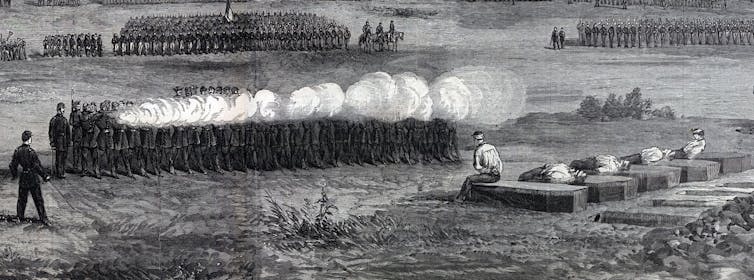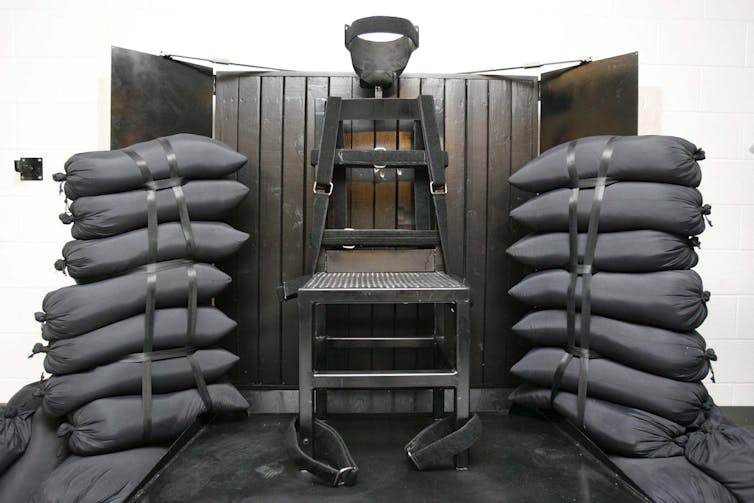
By Mark M. Smith
Americans have an appetite for reenacting the past, especially the battles of the U.S. Civil War, which took place from 1861 to 1865. Every year, in an effort to relive something of the nation’s bloodiest war, thousands don blue and gray uniforms and gather on fields where the distant echoes of war have since faded.
There are dozens of Civil War reenactments in the U.S. every year. Participants take them very seriously. Food, uniforms, even the smells of war – all are recreated to lend authenticity to the events. Only the bullets and shells are not “real.”
Now, the U.S. reenactment community has a potential new member: the state of South Carolina.
That’s courtesy of the state’s decision in 2021 to allow its inmates on death row the option of execution by firing squad. With that move, South Carolina has elected to deploy a form of capital punishment not used in the state since the Civil War.

South Carolina Department of Corrections via AP, File
A target placed over his heart
The reason South Carolina adopted the firing squad is straightforward: The state apparently has trouble securing enough lethal injection drugs to execute prisoners. That leaves the electric chair as an option. And now the firing squad.
The firing squad method has yet to be used and is currently under appeal at the state Supreme Court. I am an expert witness in this case and a historian of the Civil War.
South Carolina’s Department of Corrections has drafted firing squad protocols. The firing squad will be made up of three members drawn from prison staff. They will be behind a wall, all three of their rifles loaded with live ammunition and aimed at the inmate through an opening in the wall.
After entering the chamber, the inmate will be strapped into a chair, a hood placed over his head, and a target placed over his heart.
At this point, the warden will read the execution order aloud. Members of the squad will then fire their rifles. After the inmate is declared dead, witnesses leave.
Exclusively military punishment
Firing squad executions are extremely rare in U.S. history.
Only four states currently have it on the books: South Carolina, Mississippi, Oklahoma and Utah. Only Utah has used it as an actual execution method. Since 1976, just three executions have been carried out by firing squad in Utah.
Execution by firing squad has, in fact, never been common in U.S. history. While the term “firing squad” can be found in U.S. newspapers before the Civil War, the phrase was usually used to describe a different custom, akin to a salute, when guns were fired into the air to honor an individual of note after death.
The use of the firing squad was also rare during the Civil War. It was used principally to punish soldiers who deserted from either the Union or Confederate Army.

House Divided: The Civil War Research Engine at Dickinson College
According to Thomas P. Lowry and Lewis Laska’s 2009 study “Confederate Death Sentences: A Reference Guide,” of the 26,015 Union soldiers tried for desertion, approximately 1,243 of them, or 4.8%, were sentenced to die by firing squad; 12.4% of Confederate soldiers tried for desertion in the Army of Northern Virginia were sentenced to death by this method.
Besides the executions in Utah, there are no instances of the firing squad being used in the U.S. following the Civil War. It was an exclusively military form of punishment.
Because the firing squad was designed to deter deserters during the war, it was often carried out in a ritualized manner. It was almost always done publicly, and it was done with the explicit intention of instilling terror.
Striking similarities then and now
The similarities between Civil War firing squads and those proposed by the state of South Carolina are striking.
Like the guards drawn from the prison, the Civil War firing squad was selected from the ranks of soldiers. They typically carried out the punishment at the command of an assistant provost marshal or provost marshal, who is an army officer in charge of the military police.
The firing squad usually stood several feet from the condemned soldier and aimed at a target placed over his heart. In most cases, a blindfold was placed over the condemned soldier’s eyes and his hands were tied.

Trent Nelson/Salt Lake Tribune via AP, Pool, File
‘The awful ceremony’
There were, of course, differences between then and now. Not all firing squad soldiers during the Civil War had live ammunition. One rifle could be blank, sparing even these war-hardened soldiers the knowledge of having killed an unarmed man.
In general, the firing squad took place in a public location, like a road, a town square or a battlefield. Plainly, this is not the case in the proposed South Carolina blueprint, although reporters were at the scene of Civil War executions and a member of the press will be allowed to witness firing squad executions in South Carolina.
Some comparisons remain elusive. Will the South Carolina firing squad offer an immediate, painless death? We know that Civil War firing squads were not always immediately effective. For example, according to an 1864 report of a firing squad execution published in the Vicksburg Herald, one soldier from the 49th Regiment Colored Infantry “had to be dispatched by pistol, immediate death not resulting from the wounds by the muskets.”
Will the inmate suffer psychologically and emotionally when executed in South Carolina? Again, the Civil War provides clues. Harper’s Weekly said of an 1863 mass firing squad execution: “They all suffered terribly mentally, and as they marched to their own funeral they staggered with mortal agony like a drunken man.”
Witnesses could also find the spectacle difficult to watch. According to the
Louisville Daily Journal in 1863, “The scene was now becoming painful to the spectators, and many turned away, not wishing to witness more of the awful ceremony.” Sometimes soldiers charged with firing the deadly rounds deliberately missed their target, the burden of killing in this fashion proving too much.
Civil War reenactors know the limits of what they do. They do not attempt to recreate the fatal 1864 sinking of the Confederate H.L. Hunley submarine in Charleston Harbor; neither do they attempt to recreate deadly monthlong sieges, such as the one at Vicksburg in 1863. Nor do they reenact firing squad executions.
Yet the state of South Carolina is willing to quite literally reenact a practice from some of the country’s bloodiest history – a practice that some soldiers, even in the middle of the greatest carnage this nation has experienced, found themselves unable to engage in.
![]()
Mark M. Smith is Carolina Distinguished Professor of History at the University of South Carolina.






























Dan Earl says
It’s effective. And never has an excited criminal gone on to commit more crime after the execution was carried out, Ever!
Deborah Coffey says
Lethal injection is better? Not really. https://www.npr.org/2020/09/21/793177589/gasping-for-air-autopsies-reveal-troubling-effects-of-lethal-injection
Jimbo99 says
I think this is more a reaction to give those sentenced to die that option to choose, “a death by _______”. There’s really no kind way to perform an execution. But let’s face it, some of those folks that are murderers, they weren’t exactly humane in their methods. What society ends up with is a Parkland sentencing, stacking on life sentences for victim(s). And the next case up, the stabbing victims of the 4 in Idaho. And what’s interesting, there are certain politicians that would restore voting privileges for an extra vote.
https://www.corrections1.com/capital-punishment/articles/oklahoma-death-row-inmates-say-theyd-prefer-firing-squad-over-lethal-injection-knBDgXvB5JQffq8T/
Michael Cocchiola says
I don’t get it. We pretty much know that the threat of execution does not deter murderers. Twenty-four states still have active execution policies. After falling in the 1990s, murders in the 2020s hover at a higher rate than in the 1990s. That’s up, not down, while executions continued. So, one can at least postulate that murders happen no matter how many people we execute.
Anyway, the question arises – why is South Carolina so anxious to kill their prisoners? And why stop at shooting? If you can’t get poisons to work, why not try some novel methods like beheading, drawing and quartering, strangling, or burning at the stake? Maybe plug in Ol’ Sparky and put on a show for the public like in the good old days?
You may call it justice. It’s revenge killing. You know, like the Taliban… or Putin.
Atwp says
Why do the country use my innocent tax dollars to find a way to kill murders. I’ve some say it is inhumane to kill killers a certain way. The killers didn’t think it was inhumane to kill their victims a certain way. The firing squad in public was not a bad idea. I’m sure some people got the message don’t do wrong. Like the lynching years, most I believe we’re done in public to put fear in Black People. One of the messages they sent was the white man was in complete charge. This is what happens when you don’t obey or you try to help the Black Man. The difference is the Black Man was trying to make a better life for their families they were innocent. They put a lot of fear in the Black Society. They did have almost complete control. Capitol punishment was for criminals and the lynchings were for fear and complete control over another race of people they hated with demonic hatred and murderous activities. Church Sunday Morning and a public lynching on Sunday Afternoon. The white American Way. Church and murder.